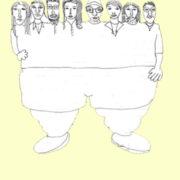Adult therapist in the adolescents group
Abstract
The therapist’s function in a group of adolescents can’t be kept out of consideration from one’s own mental disposition, experience, cultural references and from one’s own adolescence. The teen-agers themselves are able to recognize the leader’s psychological profile and to challenge the adult-therapist attacking his or her vul-nerability. Before discussing the subject, it is important for me to specify that I work as a therapist in a public psychiatric structure in Rome. In this context, I hold positions in the institution as an administrator and as a therapist. The patients expect many things from me: they would like a comfortable room, with nice furniture, while at the same time maintaining total availability. Often patients who use public services are guided by some fantasies: the ambulatory is seen like a big good mother that can offer many things, not particulary punitve and that is ready to receive everybody,a structure that functions like a large-meshed net. The operators are often trusted to by the fantasy to be omnipotent and to be very good in their work because they have many years of experience and because they have seen many patients. All this, unavoidably, brings the risk of running into frequent disappointments, devaluations or idealization of the therapist. In this congress it is important for me to investigate which functios are brought up by the group of Read more


